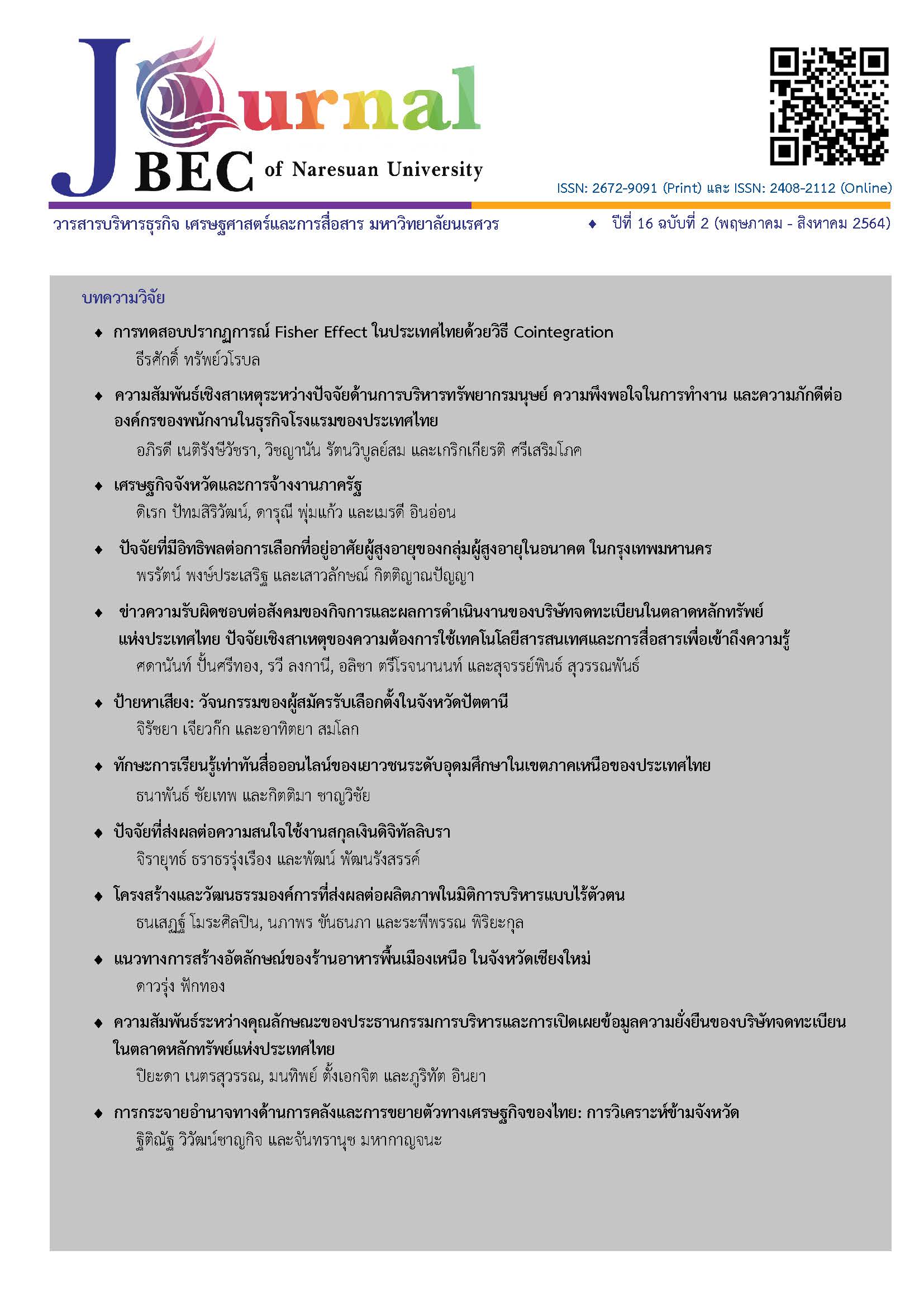การกระจายอำนาจทางด้านการคลังและการขยายตัวทางเศรษฐกิจของไทย: การวิเคราะห์ข้ามจังหวัด
Main Article Content
บทคัดย่อ
การศึกษาครั้งนี้มีวัตถุประสงค์เพื่อศึกษาผลกระทบของการกระจายอำนาจทางด้านการคลังที่มีต่อการขยายตัวทางเศรษฐกิจ กำหนดหน่วยการวิเคราะห์ (Unit of Analysis) คือ จังหวัด ทำการศึกษาระหว่างปี 2553-2560 โดยใช้กลุ่มตัวอย่างจำนวนทั้งสิ้น 76 จังหวัดทั่วประเทศ (ยกเว้นบึงกาฬ) งานศึกษานี้จะเป็นครั้งแรกของไทยที่ใช้หน่วยการศึกษาระดับจังหวัดในการทดสอบ สำหรับผลการทดสอบความสัมพันธ์กับแบบจำลองการขยายตัวทางเศรษฐกิจพบว่า ตัวแปรการกระจายอำนาจทางด้านการคลังที่ไม่รวมเงินอุดหนุน (FD)ซึ่งพิจารณาจากภาษีที่องค์กรปกครองส่วนท้องถิ่นจัดเก็บเอง (Own-revenue) เทียบกับรายได้ทั้งหมดมีความสัมพันธ์ในทิศทางตรงข้ามกับการขยายตัวทางเศรษฐกิจแต่ไม่มีนัยสำคัญทางสถิติ ขณะที่ตัวแปรการกระจายอำนาจทางด้านการคลังรวมเงินอุดหนุน (FDG) ซึ่งพิจารณาจากภาษีที่องค์กรปกครองส่วนท้องถิ่นจัดเก็บเองรวมกับเงินอุดหนุนจากรัฐบาลกลางเทียบกับรายได้ทั้งหมด มีความสัมพันธ์ในทิศทางเดียวกันกับการขยายตัวทางเศรษฐกิจอย่างมีนัยสำคัญทางสถิติ สำหรับตัวแปรอื่นที่มีความสัมพันธ์ในทิศทางเดียวกันกับการขยายตัวทางเศรษฐกิจอย่างมีนัยสำคัญทางสถิติ คือ ปริมาณจำหน่ายไฟฟ้า และจำนวนนักท่องเที่ยว
Article Details
เอกสารอ้างอิง
Adefeso, H. A. (2014). Local decentralization and economic growth in Nigeria. ACTA Universitatis Danubius, Vol. 10, no. 3, pp. 102-115.
Baskaran, T. and Feld, L. P. (2013). Fiscal decentralization and economic growth in OECD countries: Is there a relationship? Public Finance Review, 41(4), 421-445.
Bodman, P. (2011). Fiscal decentralization and economic growth in the OECD. Applied Economics, 2011, 43, 3021–3035.
Brennan, G. and Buchanan, J. M. (1980). The Power to Tax: Analytical Foundations of a Fiscal Constitution. Cambridge: Cambridge University Press.
Chareongwongsak, K., (2015). Opportunities and obstacles of Thailand in becoming a high-income country. The Academic Journal of Buriram Rajabhat University. Vol. 7, no. 1, January-June 2015. 1-24.
Chinnasri, W., Ruangsom, W. and Mala, T. (2015). Enchaining effectiveness in revenue collections of local authorities. Journal of Politics and Governance, Vol 6 No 1, Sep 2015-Feb 2016. 184-201.
Filippetti, A. and Sacchi, A. (2016). Decentralization and economic growth reconsidered: the role of regional authority, Environment and Planning C: Government and Policy, 34(8), 1793-1824.
Horrayangkul, C. and Wutthirong, C. (2003). Influence of fiscal decentralization factors on Thailand economic growth. Journal of the Society of Researchers, (18) Vol. 2 May-Aug 2003, 42-54.
Jitsuchon, S. (2012). Thailand in a middleincome trap. Thailand Development Research Institute Quarterly Review, 27(2): 13–20.
Jitsuchon, S. (2013). The Public policy project to raise Thailand to escape the middle-income trap. Good public policy support plan and Thai health promotion foundation. August, 44-47.
Jitsuchon, S. (2014). Enhancing Thailand's long-term economic growth: institutional perspectives and recommendations, (Research Report). TDRI: Thailand Development Research Institute. 18-25.
Krueathep, W. (2010). Myth of fiscal decentralization and macroeconomic growth: A case of Thailand, Sripathum Review, (10) Vol 1, Jan-Jun 2010, 60-74.
Lockwood, B. (2006). The Political Economy of Decentralization. Handbook of Fiscal Federalism Cheltenham, 33–60.
Musgrave, R. A. (1959). The Theory of Public Finance. McGraw-Hill, New York, 1959
Nguyen, L. P. and Anwar S. (2011). Fiscal decentralization and economic growth in Vietnam, Journal of the Asia Pacific Economy, Vol. 16, No. 1, February 2011, 3–14.
Oates, W. E. (1993). “Fiscal decentralization and economic development”, National Tax Journal, 46 (2): 237-243.
Pattamasiriwat, D. (2008). Local public finance: gather research articles to increasing local empowerment (3rd ed.). Bangkok. pp. 125-132.
Phouthakannha, N., at el, (2020). Fiscal decentralization and economic growth in Thailand: A cross-region analysis, International Journal of Financial Research, Vol. 11, No. 1; 2020, 147-156.
Tanchai, W., Kokpol, A., Itsarachaiyos, S., Hongnakorn, W., Suksek, A., Kingphong, P., et al. (2015). The research project policy recommendation: innovation for revenue development of local government. Bangkok: King Prajadhipok’s Institute. 7-44.
Thawornkraiwong, S., Sirilai, B. and Kedpittaya, T. (2011). Step over middle income trap: The role of investment in infrastructure (Growth management for Thailand: The role of infrastructure). Bank of Thailand, 23-25.
Varanyuwattana, S. (2011). New ways of development for Thailand’s local government Revenue. College of Local Government Development, King Prajadhipok’s Institute. 86-87.
Wiwatchankij, T. (2005). The effects of fiscal decentralization to local government on size of government under leviathan hypothesis: Thailand Case Study Between A.D. 1998-2002. Master’s Thesis. Thammasat University, Bangkok, 130.
Wongsindhuwiseth, P. and Charunpipatkul, N. (2017). Middle income trap: economic traps a waiting through. Economic Analysis Review: Bank of Thailand, November 2017, 1-4.
Yushkov, A. (2015). Fiscal decentralization and regional economic growth: theory, empirics, and the Russian experience. Journal of Economics, 1(4), 404-418.


